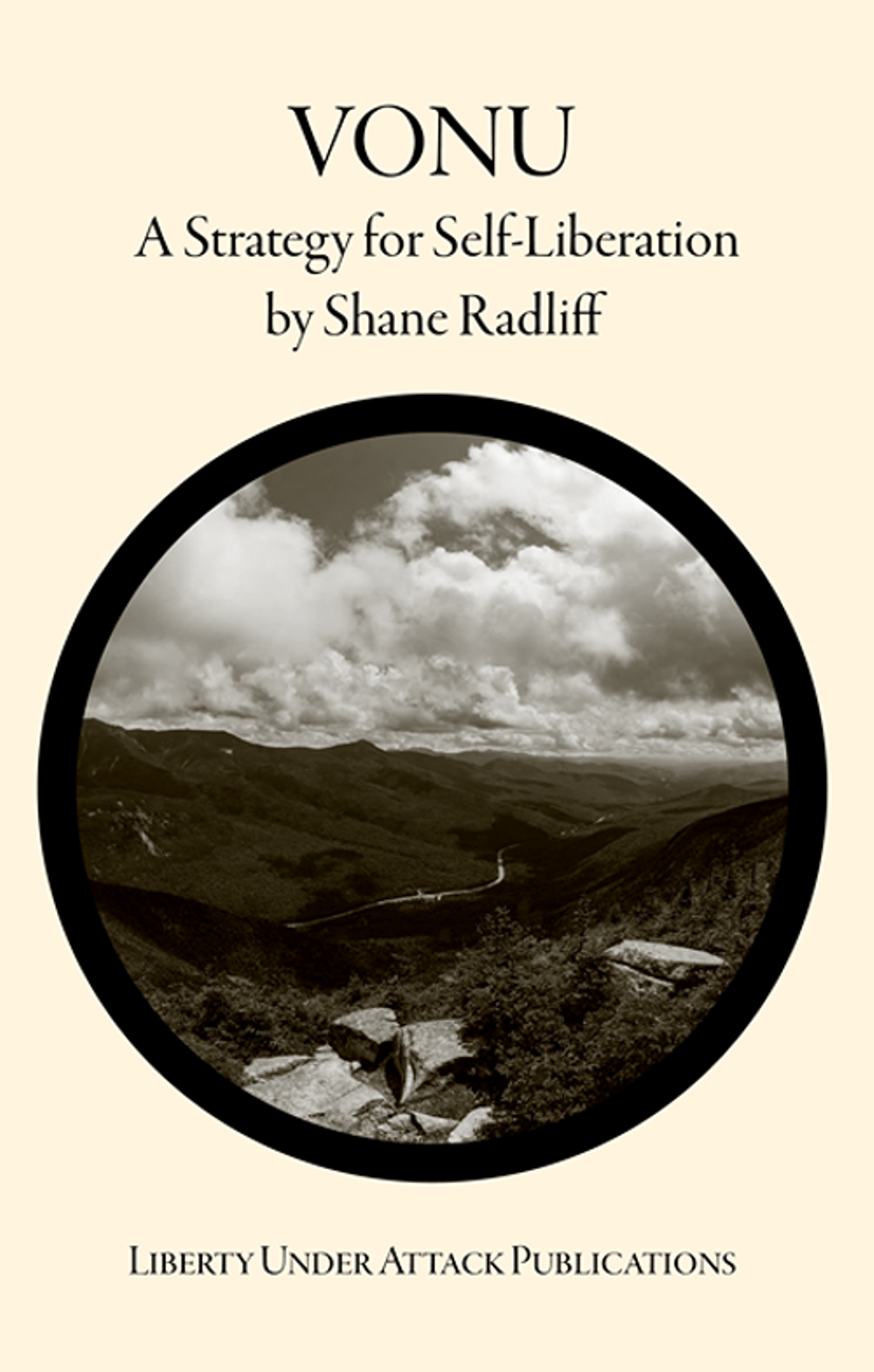Podcast: Play in new window | Download
Subscribe: Apple Podcasts | Android | Email | Google Podcasts | Stitcher | TuneIn | Spotify | RSS
[Note: On this episode of The Vonu Podcast, we cover another one of Kyle Rearden’s classic articles, found in his book, Just Below The Surface: A Guide to Security Culture. Herein, he covers the dangers of joining formal organizations, whether they tout liberty or not; and why leaderless, decentralized resistance is far more preferable…and will (in our view) be the real cause of liberation in our lifetime.
“Avoid membership in political groups or other civic organizations. As a rule, these groups are filled with super sneaky, nosey individuals more willing that not to stab someone in the back if it suits their selfish purposes. Total snakes.”
~~~
People ought to collaborate whenever they can in order to achieve their goals. Individuals who become familiar with each other have the potential to develop a molecular level bond of trust, which is essential for the smooth operation of any activities they may choose to perform. However, joining a formally organized activist group, much like using “suspicious” email keywords or custom aluminum warning signage, is usually more trouble than it’s worth.

Populism is usually the driving force behind activists who feel the need to organize, whether it be nationally or in their local communities. This democratic impulse is typically based on the assumption that the theory of critical mass is valid, despite all historical evidence that suggests foundational change is normally caused by relatively few people, as is the case, for example, with a coup d’état. The reason socio–political movements rarely achieve their stated goals is, more often than not, due to the simple fact that with the greater adoption of their professed values, their principles become diluted as the sheer number of self-identified adherents grow – this is source behind the derisive phrase, “cultural bowel movement.”
Truth be told, populism is really just another form of collectivism. Whether the specific context is nationalism or egalitarianism, the operating presumption is that “we” are all in “this” together, whatever that may be. All too often, reformism becomes the modus operandi, thereby leading its practitioners down the road to perdition; as Larken Rose has said:
“Most ‘activism’ is completely worthless; in fact, it’s worst than completely worthless [because] it accomplishes more harm than good…I speak from experience. Many, many years ago, when I still believed in statism, I was politically active, and I campaigned, and I played those games, and I wrote my congressman, and did all that stuff (I’m kinda embarrassed to admit it now), but, yeah, I did that too. At the time, I really and truly believed that I was ‘fighting the right fight,’ [that] I was fighting against the beast. It only occurred to me many years later that I was actually feeding the beast lots and lots of fuel.”
This rather profound insight shows the gaping hollowness permeating formally organized activist groups. How can reflexively spouting that education is the answer to every single problem be true if such “education” is rampantly littered with misinformation and disinformation?
If political fieldtrips are to serve any useful function, it is that the exercise of this technique will break the back of populism’s legitimacy within the minds of its victims. Once you personally witness Leviathan, under normal circumstances, acting within its own natural habitat, the sheer horror that is the daily routine of government will also become equally apparent in the politicking that is all too common within “organized” activist groups, as well. In short, formal activist organizations are a reflection of the State itself, especially considering their top-down organizational structure with regional chapters who report back to their centralized headquarters.
Whether it be labeled the patriot, liberty, or truth “movement,” those individuals who demand more freedom usually attempt to organize themselves in the hope that doing so will serve as a force multiplier. Presuming this were true, then what could possibly explain when the polar opposite, as a matter of course, becomes the typical result? The history of contemporary activist organizing suggests to me that ulterior motives, especially when coupled with a naïve misunderstanding about how an organization seeks to achieve its stated goals, creates an atmosphere of disingenuous rhetoric and moral hypocrisy.
Consider, for a moment, when the Constitutional Sheriffs and Peace Officers Association (CSPOA) publicly issued those letters written by county sheriffs who voiced their opposition to the federal government’s proposed unconstitutional gun control measures, back in 2013. Similarly, was the Tenth Amendment Center (TAC) successful in nullifying unconstitutional federal actions vis-à-vis the passage of HB 910 right here in Texas last June? Are the Three Percenters truly going to protect America on the off-chance that the Schumer hits the proverbial fan? I’d suggest that CSPOA’s released letters simply reinforced a misunderstanding about the viability of “constitutional” sheriffsin securing the right to keep and bear arms, that HB 910 had nothing whatsoever to do with TAC’s advocacy of state “nullification,” and that the Idaho Three Percenters will flee at the slightest sign of real danger, as they did last February when they abandoned the Final Four at the Malheur refuge into the waiting jaws of the FBI.
In 2009, Luke Rudkowski solicited donations intended for a legal defense fund on behalf of himself and two other members of We Are Change to the tune of $4,241.55 that still remains unaccounted for, in clear violation of the WAC Code of Conduct. During 2013, Adam Kokesh’s employees never accounted for the check that George Donnelly sent Adam v. The Man for $5,431.58 – despite that they never disputed the fact that Donnelly had already sent AvTM 4.5002619 Bitcoins & 120.5 Litecoins (~ $450 & $284, respectively). Speaking of Bitcoin, Coin Center and the Bitcoin Foundation are quite fond of “building relationships” with federal regulators who desire to centrally plan every facet of life from cradle to grave; when I attempted to warn Bitcoiners about this last year, few of them seemed to give a damn – the lack of righteous indignation truly does mean, at least to my mind, that the silence is deafening (no wonder Bitcoin developer Mike Hearn quit!).
Also in 2013, Christopher Cantwell was formally ostracized from the Free State Project (FSP) by its Board of Trustees for reminding everyone of their common right of revolution, which is enumerated in Article 10 of New Hampshire’s Bill of Rights. Later that year it was revealed that none other than Free Keene’s Ian Bernard was the individual who encouraged the FSP Board to scrutinize the rhetoric of Larken Rose, as if ritualistic purges are necessary in order to rid “the Party” of assorted undesirables. Not only did Cantwell and Bernard have their own falling out last year, but once the FSP reached its “goal” of 20,000 signers to the non-contract that is the Statement of Intent earlier this year, they were all too quick to formally ostracize Bernard himself, oh-so-conveniently a mere three days before the FBI raided Bernard’s home in Keene.
Why anyone would bother paying for tickets in order to attend Liberty Forum or the Porcupine Freedom Festival (aka, “Porcfest”), or otherwise continue donating money to the FSP, in light of their treatment of both Cantwell and Bernard, is truly beyond me. Even Bernard, of all people, didn’t deserve that kind of treatment, given that in this country, there is such a thing as the presumption of innocence until proven guilty. Yes, it is true that I have advocated for a boycott of Free Talk Live for two years now (and still do), but how Bernard was demonized here is beyond appalling, especially considering it is a well-known fact that Bernard was the FSP’s most successful recruiter; once the FSP Board had achieved their fake goal, they were all too quick to cast him out into the cold alone to be at the mercy of the government’s wolves, weren’t they?
During the Bundy Affair of 2014, the Oathkeepers attempted to pick a fight with the various militia units, many of whom responded to a call out by Operation Mutual Aid (now known as Operation Mutual Defense). When the fake drone strike occurred, the Oathkeepers fled and left the women and children at the Bundy Ranch to suffer what thankfully never transpired, yet in the aftermath of the 2015 Chattanooga shootings, Operation Protect the Protectors was launched in order to have people stand guard at the military recruitment stations (despite the evils committed by the warfare state). This is why they are now derisively referred to as the Oathbreakers, not to say how they also conveniently abandoned Charles Dyer, who was their U.S. Marine liaison.
Between 2014 – 2015, the absorption and dilution of the Jews for the Preservation of Firearms Ownership (JPFO) by the Second Amendment Foundation (SAF) was outright scandalous. Alan Gottlieb disgraced Aaron Zelman’s legacy thoroughly, so it is no exaggeration to say that the JPFO sellouts on the board of trustees offered their organization up on a platter to the SAF, without so much as consulting their membership at all. The transferral of the rank-and-file membership’s personally identifiable information from JPFO’s mail lists to the SAF, without their consent, is a grave breach of security culture, to say the least.
Similarly in terms of violating privacy, Mark Kessler’s III% Boots on Ground and Constitutional Security Force tricked some American patriots into filling out an rather invasive application for membership. As Gary Hunt described it:
“Nearly every person who joined the III% BOG completed and sent to Kessler an application, sufficient in detail to positively hundreds, perhaps thousands, who joined his organization. The information requested is far more extensive than you would fill out for a job, and includes questions that are appropriate for psychological evaluation, or profiling.”
When Kessler outed himself as a government informant on the December 2nd, 2014 broadcast of The Alan Colmes Show, this confirmed he was serving as a (non-sexual) honeypot, of sorts. According to Hunt’s partial transcription of that interview, Kessler admitted the following:
COLMES: How many people would you say came out of the woodwork, or how many groups came to you as a result of the bait that you threw out there?
KESSLER: Thousands and thousands and thousands; they have no idea…
COLMES: And what? You turned them over to the feds?
KESSLER: My job was to find out if they were dangerous or not. If they were a dangerous group or deemed a threat to society, well then, we took care of business.
* * *
COLMES: How is your name not attached to this? You don’t want to tell us what agencies, where you got this information, who you work for?
KESSLER: I was intel, I was strictly intelligence.
* * *
COLMES: Where can the citizens go and see the results of this? Is there any place we can learn more about it?
KESSLER: My part is finished. I’m not at liberty, I can’t reveal which agencies…
COLMES: Will there be a time when you will be able to reveal that?
KESSLER: Yes, I’m sure there will be, but right now, there are still pending investigations going on. I cannot reveal what’s going on…
Notice that Kessler admitted he had engaged in unjust profiling, on the thinly veiled excuse that such targeted individuals were “deemed a threat to society.” So, if you were to put together the invasive questions on the III% B.O.G membership application (which is rife with misspellings) with Kessler’s very public confession, I think it is more than safe to say that Kessler was quite disingenuous toward those individuals who consider themselves patriotic militiamen.
Not that joining a formally organized activist group is a one-way ticket to a government dungeon by any means, for it is also equally possible that they will lead you by the nose through sucking time and money away from you with your consent, simply because you believed in their pabulum. Texans for Accountable Government (TAG) has really gone downhill in recent years, yet, I remember when John Bush really worked that group as its executive director. Although the charismatic Katie Brewer and the wonderfully firebrand Heather Fazio were still there as of last year, I doubt even they can “rescue” it from Justin Arman and his reformist allies like Dr. Laura Pressley, nor should they.
Off-grid homesteaders are not immune from the corrupting influence of other activist organizations, for the fate of the SLV Just Us group in Costilla County, Colorado last year testifies such to be the case. They were able to withstand the pressure from both the Costilla County government and the bigoted Hispanics within the Town of San Luis, but when Operation Patriot Rally Point rolled on in, the homesteaders were balkanized so badly they were unable to recover. As Alex Ansary commented three days after the disastrous “Meet the Judge” event:
“I will never trust certain people to vet certain people ever from this point on. It is irresponsible to assume other people will just do the vetting for us and vet certain members, and make sure they are who they say they are; well, that wasn’t done. No group or community can be fully safe if people are so naïve that they don’t even bother to question, or look up, the supposed people that are coming to the rescue.” [emphasis added]
This rather harsh truth illustrates the fact that when activist organizations clash, the fall-out is bound to be a degradation of solidarity, not a reaffirmation of it. Just because people have grievances and are seeking remedies to alleviate them, does not therefore mean that such proposed techniques are effective at remedying those grievances. When there is a difference between activists regarding strategy and tactics, it is a fait accompli that the sparks will fly, thereby leading to schisms and overall fracturing, unless interpersonal diplomacy takes place quickly in order to mitigate friction.
Sometimes the breakdown will not occur as a flashpoint, but rather, as a slow deterioration. The Williamson County “Libertarian” Party (WCLP) never had the membership who attended its meetings like TAG did, and it carried along with it the additional baggage of not only partyarchy, but also the confession made by the national LP founder David Nolan in 2008 about the monster he had created:
“We have, unfortunately, created (or the party has created) a little class of mini-bureaucrats who are more concerned with keeping their job and perpetuating the institution as an institution and raising money, than they are with spreading the message…now we’re down to the level of people who are, I think, for the most part, well-intended, but when compared to those men [i.e. Murray Rothbard], are several orders down the intellectual scale, and they’re absorbed with minutiae, and they are concerned with fund-raising, and they are afraid to say anything that might scare people, because that might keep people from voting for us, so it’s become a very timid organization in the last 6 or 8 years.”
When you additionally consider that the WCLP’s own Robert Butler brazenly took credit for something neither he nor the WCLP did last year regarding a few red light traffic cameras, then the disingenuousness the anti-libertarian “Libertarian” Party oozes forth becomes rather apparent, as was also the case with Shane Radliff’s political fieldtrip to a meeting of the McLean County “Libertarian” Party (MCLP) last year.
The latest of these organizational travesties is the bickering amongst “sovereign” citizen groups, most notably the “Continental uNited States of America” and the National Liberty Alliance. As you may remember, the latest “sovereign” citizen trend has been for some of them to become fake judges and then convince others that they are the same as the flowing black-robed men. Bruce Doucette, specifically, balkanized the SLV Just Us group, as well as inserting himself into the statist turf war not too long afterwards.
Assuming that the rule is that formal activist organizations are not conducive to your freedom or privacy, then what would be the exception to that rule, if any? Organizations such as the Home School Legal Defense Association (HSLDA), the Texas Home School Coalition (THSC), the Institute for Justice (IJ), the Foundation for Economic Education (FEE), the Ludwig von Mises Institute (LvMI), and the International Society for Individual Liberty (ISIL) seem to have a few traits in common. Either these are purely educational, as is the case with FEE, LvMI, and ISIL, or they are engaged in some form of legal activity, like what THSC, HSLDA, and IJ do.
Of course, when evaluating the purported accomplishments of any formally organized activist groups, it might become useful to compare them to those similar activities by individuals whose efforts are directly parallel. The New Hampshire Liberty Alliance (NHLA) has produced Liberty Rating reports for twelve years now about the New Hampshire General Court, yet, I would suggest that Chris Cantwell’s Anarcho-Lobbyist series is noticeably more transparent, and without all of the overhead. Although the FSP imagines itself as having “accomplished” 20,000 signers, it would seem to be the case that people are flocking in droves into the American Redoubt, as well as the American West more generally; the best transparency for this comes from John Schmidt and Alex Ansary, respectively.
Most importantly, the violations to security culture posed by activist organizations is staggering. Whether it be due to snitches, datamining, snitch-jacketing, doxxing, false accusations of stealing from legal defense funds, or potentially even losing your job, joining most activist organizations will likely increase your opportunity costs at the very least, and reducing your freedom at worst. In other words, all things being equal, it is more than fair to say that activist organizations are more trouble than they are worth.
Leaderless resistance is the best alternative to formal organizations, from what I know. Briefly, leaderless resistance enjoys the traits of affinity consensus, mutual aid, and plausible deniability; in other words, simplicity, flexibility, and privacy. Applications of leaderless resistance include security teams, freedom cells, and even the alternative media itself.
As I’ve mentioned in the past, everything I’ve done to free myself has been done either alone, or in concert with other individuals through fluid peer-to-peer relationships. Formally “organized” groups are much too top heavy in practice, and in fact, impose drastic opportunity costs upon their memberships. By contrast, leaderless resistance is, I think, the best approach to “organizing” libertarians and other individuals, whether the purpose for doing so is a business cooperative or monkey-wrenching. Top-down, hierarchical “groups” get infiltrated, whereas interpersonal relationships are really only susceptible to blackmail and extortion, at most; this makes them noticeably harder to penetrate and disrupt.
Organizations don’t matter, but relationships do. Formal activist organizations, when all is said and done, end up destroying any semblance of solidarity. Celebrity gatekeepers effectively neutralize grassroots “movements” for the benefit of the enemy, and in this respect, those “celebritarians” and Patriot Rockstars are little different from the Volksdeutchers in Nazi-occupied Poland. The only real purpose for these formally organized “groups” and “movements” is not to accomplish their stated objectives, but rather to provide an advertising brand that its membership will self-identify with (and donate money to), by feeling good about doing nothing productive at all.
Activist organizations are highly overrated in their efficacy for securing individual liberty. Too many of them are organized like a pyramid, and if Americans are going to enjoy liberty within their lifetime, then that pyramid must be flipped upside down. Truly grassroots “organizing” means doing so from the bottom-up. Whether organizing models like the emerging local Committees of Safety (or libertarian grassroots entities such as Liberate RVA and the Houston Free Thinkers) are worth anything in this modern age, remains to be seen, yet, it is my hope that upon further investigation, these different ways of coordinating human action, as the purposeful behavior that it is, will yield an answer.
[DOWNLOAD FOR FREE!]




